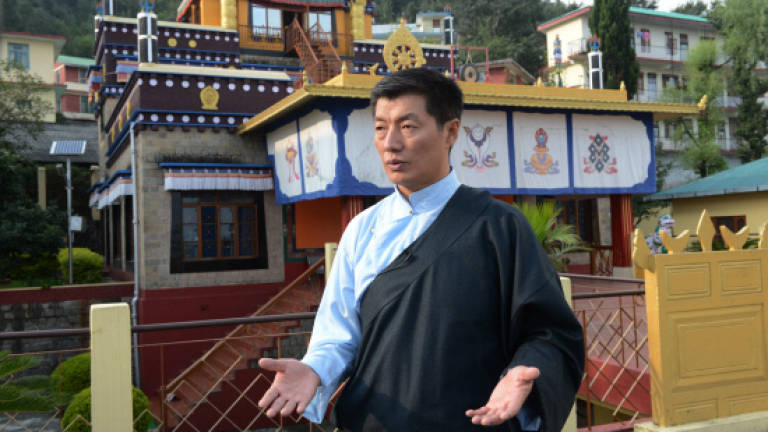Dalai Lama marks Nobel anniversary as Western support wanes

DHARAMSALA, India: As the Dalai Lama marked his 25th year as a Nobel laureate this week, a row over South Africa's failure to grant him a visa underscored the huge challenge facing the movement he launched more than half a century ago.
The Tibetan spiritual leader was awarded the Nobel peace prize in 1989, amid international condemnation of Beijing following a deadly crackdown on peaceful protesters in Tiananmen Square earlier that year.
The award catapulted the charismatic Buddhist monk into the global spotlight, and in the decade that followed he was courted by US presidents and Hollywood stars alike as he criss-crossed the world campaigning for greater autonomy in his homeland.
But, a quarter of a century later, some Western leaders are turning their backs on the Tibetan spiritual leader -- albeit often reluctantly -- under pressure from rising power China.
On Thursday, a summit of Nobel peace laureates due to be held in Cape Town later this month was cancelled after several pulled out in protest at the South African government's failure to give the Dalai Lama a visa.
The decision provoked an outburst of fury from fellow laureates including Archbishop Desmond Tutu, who said he was "ashamed to call this lickspittle bunch my government".
The Dalai Lama himself accused South Africa of "bullying a simple person", using uncharacteristically undiplomatic language.
But South Africa is by no means alone in its reluctance to antagonise China, its largest trading partner.
Even Norway, one of the world's wealthiest countries and the home of the Nobel peace prize, snubbed the Dalai Lama when he visited earlier this year in what it called a "necessary sacrifice" to normalise its relations with China.
"Given the economic growth of China... you can clearly see some countries, even European countries, have some hesitation in dealing with sensitive issues like Tibet," said Lobsang Sangay, who took over as head of the exiled Tibetan government in the Indian hill town of Dharamsala after the Dalai Lama retired from politics in 2011.
"Nonetheless, at the people's level, I think the interest for Tibet still remains."
Sangay called for more international help in June, when he renewed a push for the Dalai Lama's "Middle Way" path of peacefully advocating greater autonomy for Tibet.
Praise for Xi
Since then, the Dalai Lama has said he is "optimistic" about the current administration in Beijing, in what some see as a possible sign of a thaw in relations.
In an interview with AFP this week, he praised China's President Xi Jinping for cracking down on official corruption and seeking to introduce "proper rule of law".
"These things show he (Xi) is approaching these problems more realistically" than his predecessors, the Dalai Lama said.
He also welcomed Xi's recent comments about the importance of Buddhism in Chinese society, and said he was in informal talks about making a historic pilgrimage to a sacred mountain in China.
Barry Sautman, a Tibet expert at the Hong Kong University of Science and Technology, said the Dalai Lama's praise for Xi was likely tactical.
"He said some nice things about Hu Jintao and he said some nice things about Jiang Zemin," said Sautman, referring to Xi's predecessors.
"If you want to have a political dialogue with somebody, it is better to use the honey."
Formal negotiations with China broke down in 2010 after making no headway, and many exiled Tibetans remain deeply sceptical about renewing them.
In Dharamsala though, expressing even mild disagreement with the Dalai Lama is controversial.
"For the Tibetan people, His Holiness the Dalai Lama is the Buddha... and nobody would place their personal opinion in front of the Buddha's wisdom," said Dharamsala-based activist Tenzin Tsundue, who believes in pushing for independence rather than autonomy.
"Deep down in the heart of every Tibetan there is still a desire for independence. It is the independence of Tibet that can guarantee the survival of the Tibetan people and the Tibetan culture," he told AFP.
The Dalai Lama, who appeared in good health as he celebrated his 25th anniversary with fellow laureates in Dharamsala this week, remains the universally recognised face of the movement.
But his retirement from politics was a reminder to exiled Tibetans that he will not be around forever.
For Sangay and other moderates, the over-arching goal is to secure political and cultural freedoms and autonomy in Tibetan areas of China.
He believes the new generation of Tibetans inside Tibet will be the "most important factor" in deciding its future.
Young Tibetans "have not seen the Dalai Lama, nor they have met with the exile administration," he said. "But their sense of belonging to Tibetan identity... is very strong." – AFP